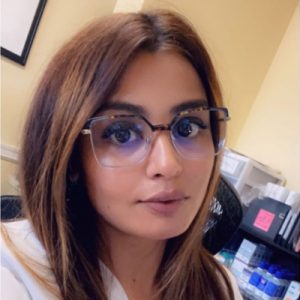Orthokeratology (ortho-k) is quickly becoming the gold standard for myopia management in children.
We have provided the top 10 most frequently asked questions about ortho-k to help you decide if this myopia management technique is right for you.
1. What is ortho-k?
A: Ortho-k lenses are rigid gas-permeable (RGP) contact lenses that are designed to be worn overnight and removed in the morning.
Ortho-k lenses gently reshape the curvature of the eye to improve vision and control myopia progression. Ortho-k lenses are designed to float on top of the eye’s tear film and apply gentle water-based (hydraulic) pressure to the front layer of the cornea, called the epithelium.
The hydraulic pressure causes the cells of the epithelium to move from the center of the cornea to the periphery. This migration of corneal cells leads to a temporary reshaping of the cornea and correction of the refractive error.
2. Is ortho-k safe?
A: Studies have compared the safety of regular contact lenses to ortho-k lenses and have concluded that ortho-k lenses do NOT increase your risk of contact lens complications.
Some of the most common contact lens complications include eye infections, hypoxia, corneal abrasions and corneal staining— all of which can lead to more serious conditions that can even threaten permanent vision loss.
To prevent contact lens complications that can occur with any type of contact lens, always follow your eye doctor’s instructions on how to properly handle and care for your ortho-k lenses, as well as when to wear them and how often to replace them.
3. How long do the effects of ortho-k last?
A: After the ortho-k lenses are removed each morning, improved vision is generally noticed for 24 to 72 hours.
For optimal results, follow your eye doctor’s instructions on how often to wear your ortho-k lenses— some patients require nightly wear, while others may be able to wear their lenses every other night.
4. How does ortho-k control myopia progression?
A: Ortho-k has been proven to reduce the rate of myopia progression in children by up to 50 percent.
Conventional methods to correct myopia and improve distance vision include eyeglasses and contact lenses— though over time, many patients experience a gradual increase in their optical prescriptions with these traditional methods.
By reshaping the cornea for vision correction, ortho-k can help to reduce the rate of myopia progression.
As a result of its safety, efficacy, and convenience, ortho-k has become one of the most recommended methods for myopia management and vision correction.
If your child has myopia, contact an eye doctor near you, who can discuss the best options for myopia management.
SEE RELATED: Why Do Adults Choose Ortho-K?
5. Who can benefit from ortho-k?
A: Ortho-k can be prescribed for children, teens, and adults.
Children as young as eight years old can benefit from ortho-k for myopia management.
Ortho-k is also a great solution for patients who are not eligible for LASIK surgery due to thin or irregular corneas, high refractive errors, unstable vision or severe dry eyes.
Ortho-k is especially convenient for athletes, as well as for patients who live in dusty, windy, dry environments or extremely hot or cold climates.
6. Do all optometrists fit ortho-k lenses?
A: Ortho-k lenses require a specialized contact lens fitting, and not all optometrists who fit regular contact lenses also fit ortho-k lenses.
Optometrists and eye doctors who provide myopia management and prescribe ortho-k lenses have undergone specific extensive post-graduate training.
During your ortho-k lens fitting, your optometrist will measure and map out the surface of your cornea using a digital corneal topographer. This device allows your optometrist to accurately fit your child’s ortho-k lenses to the shape of their eye.
If you are interested in ortho-k, it is a good idea to check that your eye doctor has experience in ortho-k and myopia management before scheduling an appointment.
7. What can you expect when you first begin wearing ortho-k lenses?
A: When you receive your lenses, your optometrist will provide detailed instructions on proper care and handling, as well as how often to wear your ortho-k lenses.
It is not uncommon to feel the ortho-k lenses in your eyes until you get used to wearing them— this may take a few days. Don’t be discouraged, ortho-k lenses become more comfortable over time.
Additionally, you may notice blurred vision, halos around lights and increased sensitivity to glare until your eyes adjust to the new lenses and reach full correction.
8. How much will your vision improve with ortho-k?
A: Many ortho-k patients are able to achieve 20/20 vision without needing any daytime optical correction.
According to a nine month FDA clinical study:
- 95% of patients achieved 20/40 vision or better
- 73% achieved 20/20 vision or better
9. How long does it take to notice maximum results from ortho-k?
A: The amount of time it takes to notice maximum results from ortho-k depends on the severity of your myopia when you begin wearing your ortho-k lenses.
For mild myopia, improved vision may be noticed after one or two days of wearing your lenses. Though, for higher optical prescriptions, it can sometimes take around two weeks to notice for maximum results.
Your eye doctor may recommend wearing glasses during the day with a low prescription until you are able to reach your desired results.
10. Can I have LASIK surgery after ortho-k?
A: Yes. If you would like to permanently correct your vision, LASIK surgery can still be an option, even if you have been wearing ortho-k lenses.
Unlike LASIK surgery, ortho-k is temporary and the results only last as long as you continue to wear your lenses.
Several months prior to your scheduled LASIK surgery, your eye doctor will instruct you to stop wearing your ortho-k lenses. This will allow your corneas to revert back to their original shape and ensure optimal LASIK surgery results.
LEARN MORE: Guide to Myopia Management
Schedule an appointment with an optometrist experienced in myopia management to find out if ortho-k lenses are right for you or your child.










